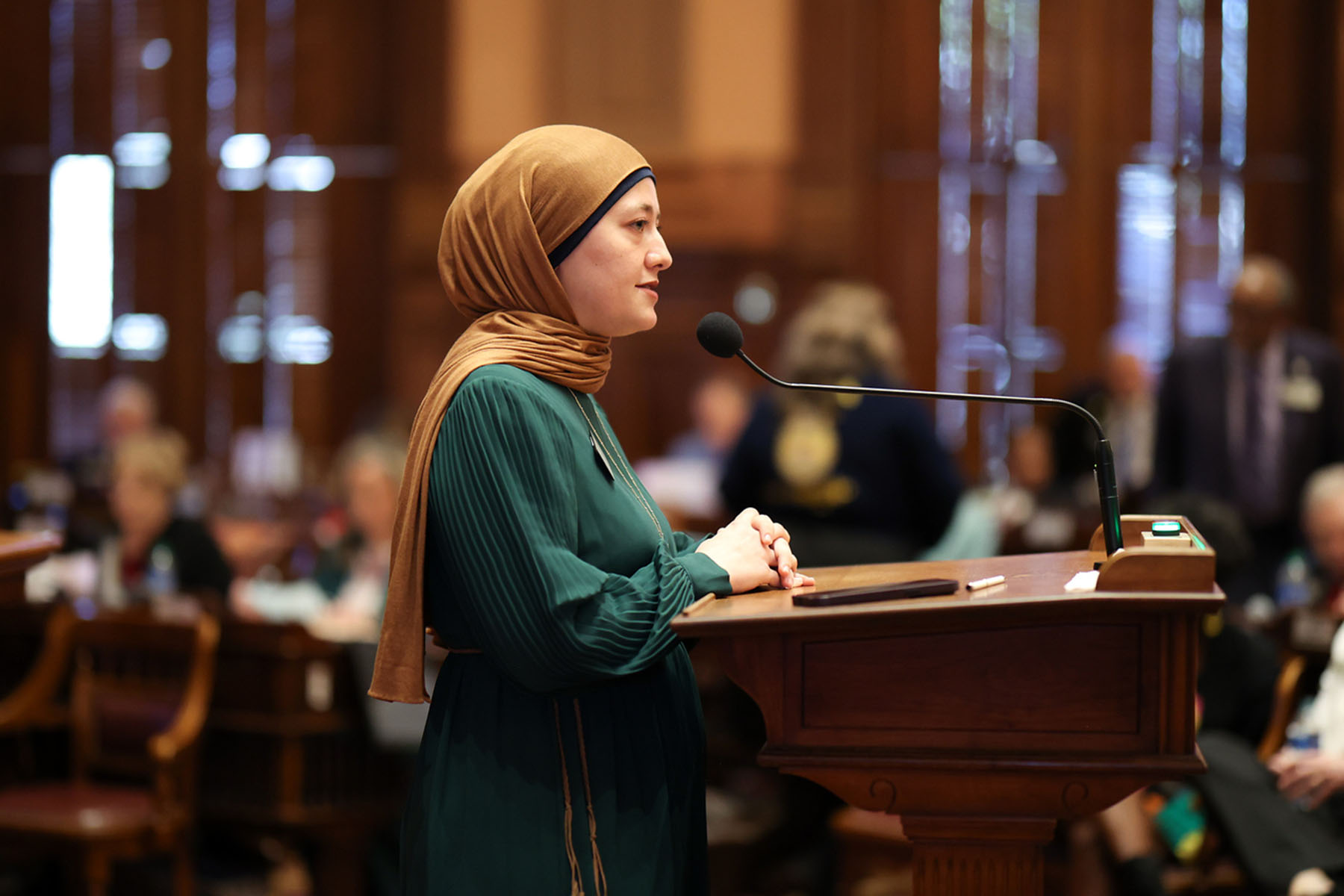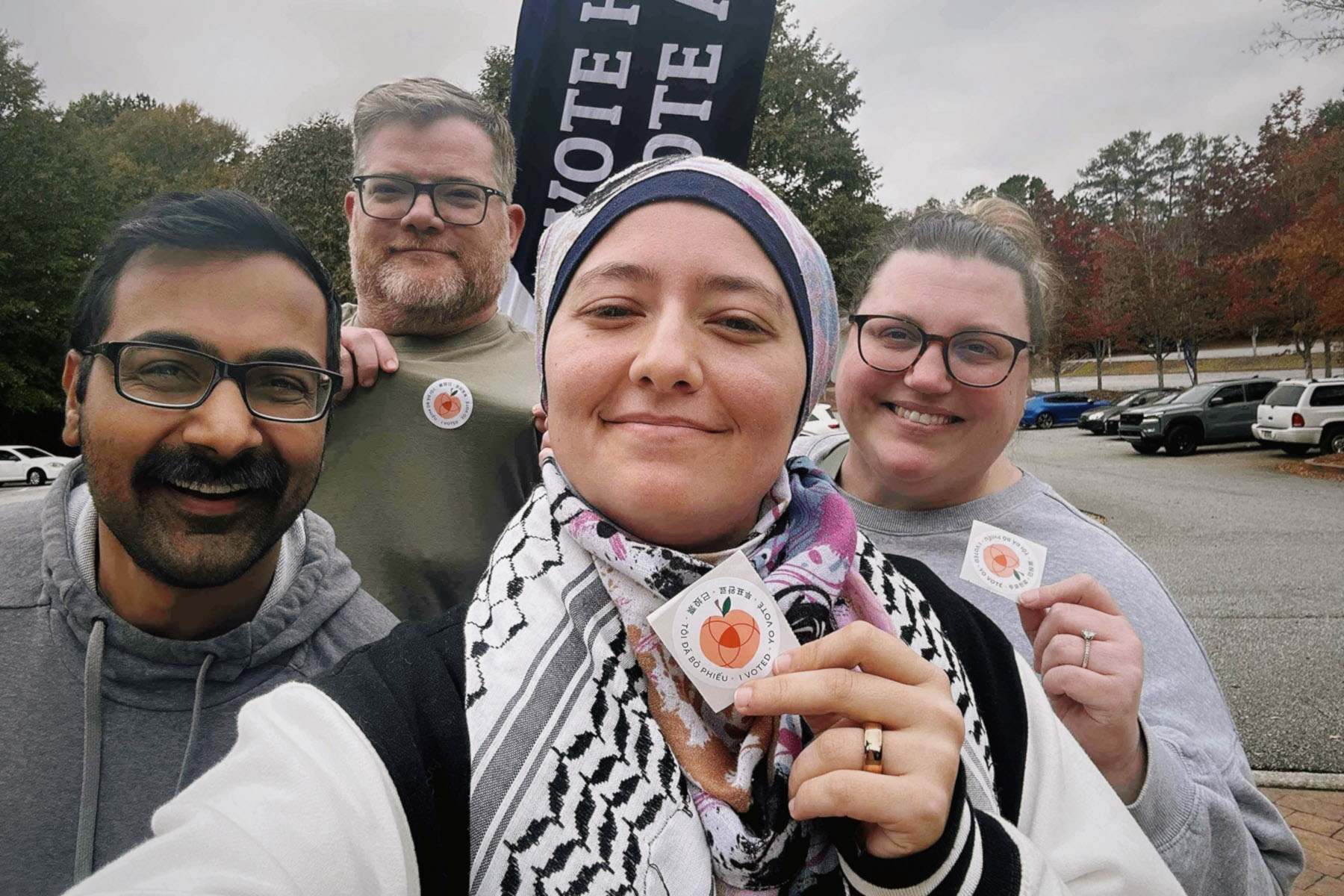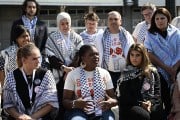When the Uncommitted Movement, formed to register Democratic voters’ objections to U.S. support for Israel in the war in Gaza, wanted to put forward a speaker for the summer’s Democratic National Convention (DNC), they suggested Ruwa Romman.
Romman made history in 2022 as the first Palestinian American elected in the state of Georgia. Even before the convention, she had been going viral on TikTok for her nuanced opinions on political organizing and on what a revolution really looks like.
Romman and Uncommitted did not get a speaking slot at the DNC. Romman read her short speech outside the venue on the last night of the convention, calling for a ceasefire and expressing support for Vice President Kamala Harris.
In September, the Uncommitted Movement announced it would not endorse Harris, but urged people concerned about Palestine to vote — just not for Trump or a third party.
Romman, 31, has found her stride talking to young people. “If young people voted more than boomers, our entire electoral system would completely change on its head,” she said. “There is a reason that Vice President Harris calls Gen Z out directly from her campaign rallies.”
This week, Romman wrote an editorial for Rolling Stone about why she voted for Harris. She spoke with The 19th about her background in political organizing, what young people disillusioned by a two-party system can do and life after the election.
This interview has been edited for length and clarity.
Jasmine Mithani: You’ve been talking a lot about November 6, or life post election. Why are you encouraging people to think about that?
Ruwa Romman: We exist in a society where not everybody agrees with us, and that can be difficult for movement building. Sometimes it’s easier to argue with people that mostly agree with you than it is to try to persuade people who are way further than you on any issue.
What I tell people is that the opposition doesn’t even have to outwork you anymore; these days, they just have to convince you that the people you work with are not good enough, and suddenly you see movements completely split open and split apart and fall apart.
A really good example of this for me personally is seeing the responses to Uncommitted because I was never a delegate. I was just the name they put forward. But I would get bombarded with comments, and I would be surprised how almost vicious some of these comments would get, even though I’m Palestinian, even though I’m somebody who has very actively opposed the current policies as relates to Gaza, have actively tried to end the genocide in Gaza by creating pressure campaigns — you name it. But what I found super interesting about it is how much time and energy was being spent on those of us who agree and are trying to work on fixing this, versus those who are the opposition. And if I wanted to take down a movement, to me, that is exactly how I would do it.
-
Read Next:
I remember when we spoke in 2022 you said your opponent used Islamophobic and racist rhetoric against you, but your community stepped up in your defense. This has been a completely wild first term in office for you. How has your real-life district that you’re representing reacted?
I have a Republican opponent. Again, this person is leaning heavily into trying to get right-wing platforms to amplify him. And it’s the same thing, but it’s from a different perspective, like “she’s a member of Hamas, she is a terrorist sympathizer.” I think a lot about what that means for voters as they try to move in this information-driven world. It makes people furious. It makes people angry.
We’ve knocked almost 10,000 doors in two months. The majority of people have been incredibly supportive, incredibly positive. And it’s funny because as a state representative, people are not supposed to know your name. But the thing that has been new is, “Oh, I saw her on TV, and she’s fighting the good fight.”
I try to explain this to my colleagues all the time. I think sometimes we’re so scared of messing up, but people really want to see somebody fighting on their behalf.
It’s not necessarily that I’m perfect or uniquely different as an elected official. I’m willing to bet that a lot of those constituents that have been really positive at the doors couldn’t name you every bill I’ve worked on, couldn’t name you specific policy discussions that I’ve led, but they can name you when they saw me fighting and to me, that’s the part that matters most. I want to put public service back into politics. That’s why I’m in politics. That’s why I agreed to run, and that’s been genuinely the best part of this.
What sort of lessons do you feel like young people need to learn about political organizing, as something you’ve been doing for a decade?
First and foremost, what I’ve learned about politics is that it’s a thing of attrition. Whoever lasts the longest gets what they want. And if there’s anything I could tell people, if they remember nothing that I told them, please be tenacious.
History is full of examples of leaders saying no until they said yes. People are waiting for you to give up. That is the reality of the situation. Your opposition is waiting for you to go away.
The second thing is that when it comes to voting and politics and elected officials, yes, we are people. Yes, you absolutely should try to engage with us and have conversations with us, because you will get way further having conversations with us than if you create a strictly adversarial relationship. However, there are also moments where, no matter what you do, the person’s not going to listen. That’s where even though you didn’t “succeed” in whatever endeavor you’re trying to do, you now have 1,000 people with you, right? You are now 1,000 people that can door knock and phone bank and support a campaign and really, really change the dynamic of things.
Politics is going to be imperfect, because it is people. And people are imperfect. If you are looking for the perfect politician to fix and save everything, that’s never going to happen. But if you view politics as sort of a board where you’ve got all these pieces and you’re trying to move them in the best direction possible as you do other work, I think we can really, really change things, and that’s why I wanted to get to a point where we stop arguing about whether or not we should vote. The right doesn’t argue about whether or not they should vote. They just vote.

Many young people in particular have been disillusioned with the Democratic Party because of the Biden administration’s support of Israel. What message do you have for people who are conflicted about voting in the presidential election this year, less than a week out from Election Day?
I’m talking about voting in general. I’m not even talking about party. I’m not even talking about a specific person right now. I’m literally just talking about the act of voting. The reality is that Jamaal Bowman and Cori Bush lost their seats because only 19 and 23 percent of people voted, respectively, literally almost half of how many people voted in the primary last cycle.
This has been the most difficult election cycle of my entire life, and I’ve been doing this for 10 years easily. I have agonized over what to do this cycle, genuinely and sincerely, like I’ve asked anybody who knows me, knows it is the only thing I’ve been talking about, of what should I do? How should I do this? What is the best path forward? And I’ve prayed on it. I’ve talked to mentors, and I’ve talked to people, and I’ve talked to friends and neighbors and family.
I need people to understand that it is soul-crushing. I have never, ever experienced anything like this before — and that we are here. The election is here, and as much as I wish it were different, as much as I wish, for example, the Harris campaign would have approached this election very differently, as much as I wish that people could give me the things that I want and need to turn voters out, I can’t control anybody else but myself. And that’s why I ultimately decided to vote for Harris on Sunday. But in exchange, I swapped my vote. [Editor’s note: Agreeing to vote for a party candidate in a swing state if another person in a non-swing state will cast a protest or third-party vote, also know as vote pairing.]
I am now in a place where I approach voting as a strategic conversation more than a moral one. It is simply a moment in time, and I know that come November 6, the day after elections, the work doesn’t stop.
My ask of people after November 5 is that we learn to merge our efforts. We learn to start walking hand in hand, even when we fundamentally disagree on things like the “system.” Instead of being so focused on how good or bad somebody in office is, start analyzing the records and start finding openings, because you will be surprised how many people are willing to listen, especially those in elected office.
-
Read Next:
One thing that I’ve been struck by while listening to many people who are campaigning for Harris, and I see this particularly when people are speaking to Muslim voters and Arab voters, is they’re citing the activism of the civil rights movement. You talked about the legacy of Fannie Lou Hamer. What lessons are you encouraging activists to draw from the Civil Rights Movement and apply today?
I always feel the need to make this disclaimer, we are not comparing ourselves to those incredible leaders. We are giving credit where it’s due when it comes to strategy. You can protest all day, every day, and if you don’t have sympathetic people on the inside it’s very, very difficult to get things to change. You need to be working every avenue and for us, you know, honestly kudos to the Uncommitted Movement, because I really do appreciate them teaching me about these figures, whether it was Fannie Lou Hamer and others who did things like integrate their respective parties, who refused to take platitudes. With Uncommitted — and this is the part that people miss — there were times where we did put the bar very low. But the idea was that if we make it easy and they say no, at bare minimum, we’re exposing the structural racism that exists.
I think people sometimes forget that again, even in failure, there are successes to build on. And in this case, we went from people not understanding why anybody would even question who to vote for this election cycle to the very awful reality that systemic racism still exists in our party, particularly as it relates to Palestinians. And am I happy about it? Of course not. But I look back on those before me who recognized those things, and instead of saying “I’m going to disenfranchise myself and give up,” they said, “No, I’m demanding the party change.”
I think we forget that movements have to start with persuasion and education and that these wins, the March on Washington that everybody talks about — that was first talked about 20 years prior. This work is long-term.
-
Read Next:
With the DNC, you’ve been in the spotlight so much on this national scale. And you’ve gone viral on Tiktok a couple times. What parts of your message, despite having this platform, do you feel like people are not paying enough attention to?
I think they’re forgetting the part where the reason I share the things that I do isn’t to absolve those in power of responsibility. They’re missing the part where I’m saying, I want us to be so powerful, people have no choice but to listen. I don’t want to keep relying on the goodwill of somebody in a position to do what I need them to do. And I think sometimes people mistake that for blind support, and they forget that when you make strategic decisions, it’s not a permanent approval of somebody.
There is benefit to outrage, but what I’ve noticed is that if all you do is tell people how things are bad, they give up, they disengage, they don’t want to do it anymore. But if you tell them this is bad, and here’s what we can do about it, to try to fix it, it changes the dynamic. It gives them hope. It gives them a way out.
What have your conversations with the Arab and Muslim voters been like, and what do you think about the strategy of voting third party to send a message to the Democratic Party?
What I remind people is that I wish we had the privilege of saying consequences be damned. I wish that I could say that we survived four years of Trump, we’ll survive another four years, but I can’t do that because the Supreme Court has completely changed the landscape of what is and is not legal for a president to do. And so I try to explain these things to them, but first and foremost, I listen. I do a lot of listening and sometimes arguing, because I’m very stubborn.
I’m not one of those people that believes that a vote for a third party is a vote for Trump. The way I explain to people is that it’s one less vote to stop Trump. It’s one less thing that solidifies that barrier to a Trump presidency.
I want to be very clear, as Palestinians in particular, and Lebanese people in particular, shame on anybody who blames us for any decision we make this cycle. I sincerely mean that. Leave us alone. Because the ask that’s being made of us is “we know we’re doing these terrible things to your family members, including displacing and killing them, by the way, but can you please save me?” And to me, the audacity of that is just mind-boggling.
Talking to my community has really felt like talking about politics during a funeral, it’s so inappropriate and it’s so awful, and it really sucks that the only way that this issue has continued to get attention is through the lens of electoral politics. That’s why we’re seeing people use their vote the way they have, because they think this is the only microphone they have. People who have lost loved ones should be spending time in mourning, should be spending time with family, should be spending time not doing this.
And I really need politics to come to a much more empathetic place. I really need us to understand because the thing is, if we enforce this perspective of empathy, it also makes right-wing fascism that much easier to destroy, because you’re setting that boundary, you’re setting that baseline. And fair or not, no matter what we chose to do this election cycle, we have a responsibility still.
To check your voter registration status or to get more information about registering to vote, text 19thnews to 26797.








